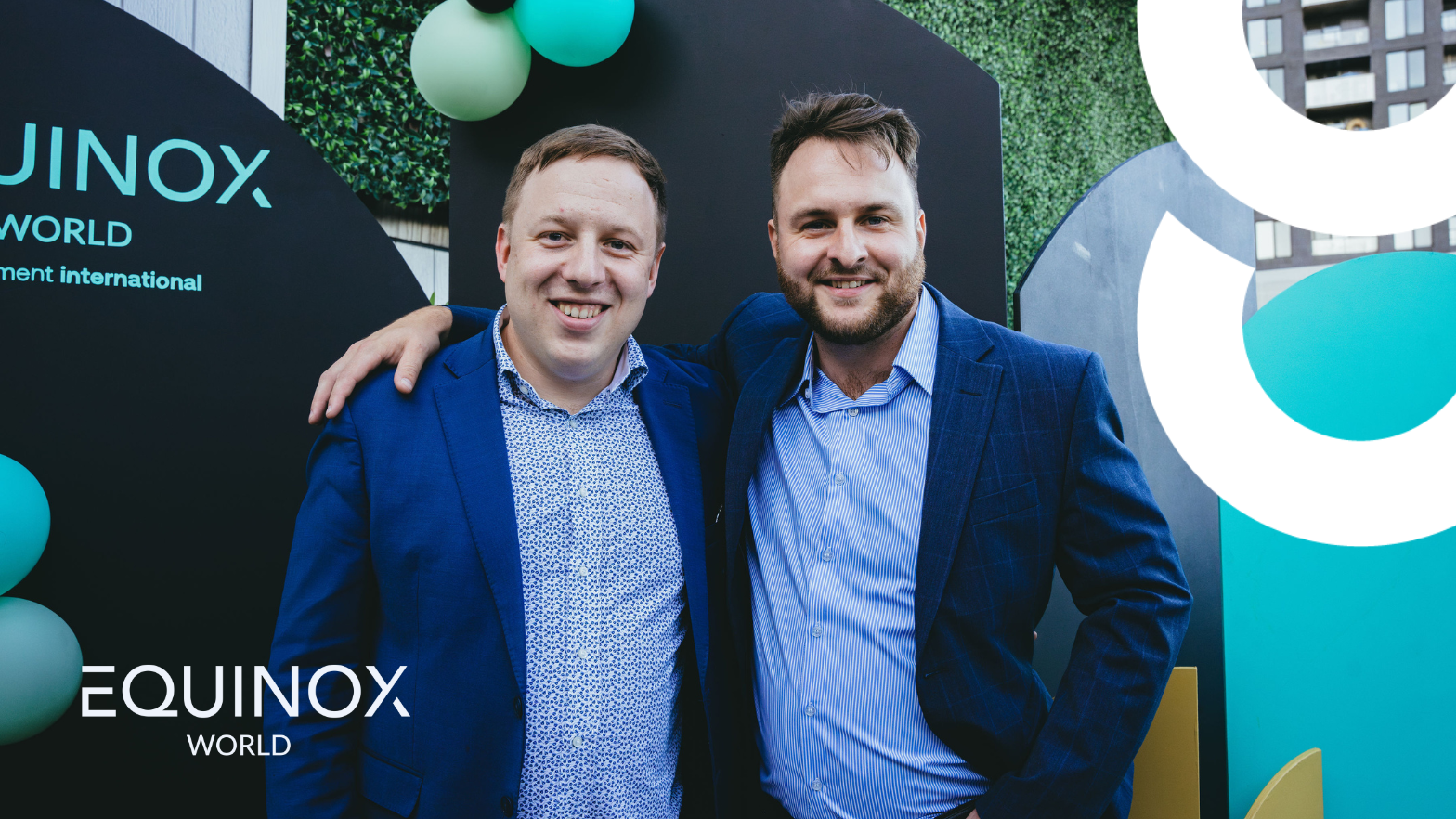Les Serres Arundel, members of our eco-responsible cohort
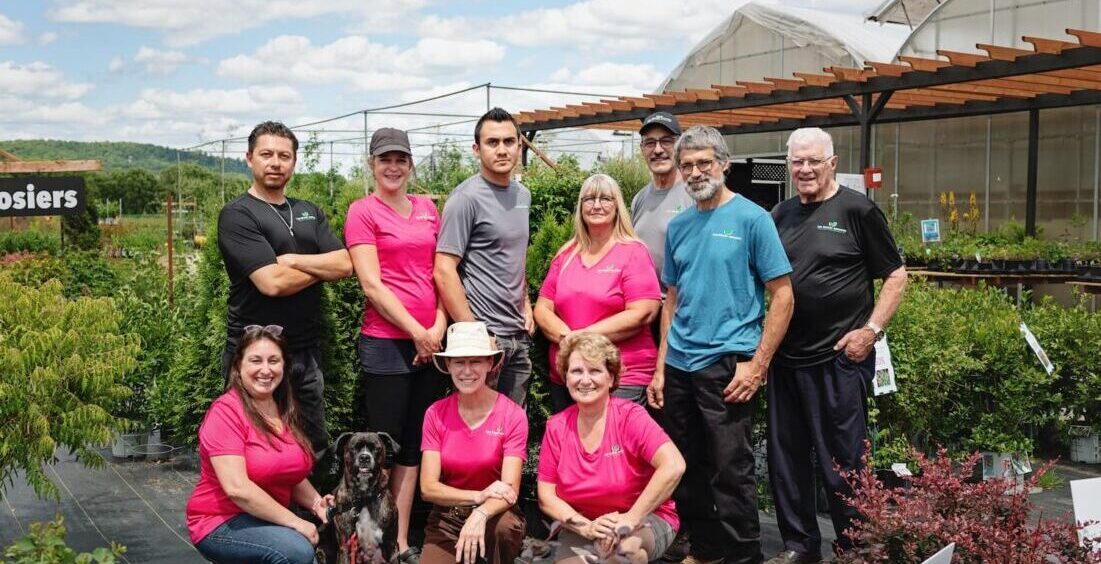
As the Laurentian horticultural company Les Serres Arundel prepares to celebrate its 50th anniversary, Guy Provost and Johanne Meilleur share the vision of sustainable development that they have maintained for several decades.
What motivated you to be part of Groupex’s first eco-responsible cohort?
Guy Provost: We have always focused on initiatives that limit waste. This was the case with the dairy farm we had, and it’s what we do today in Arundel and Mont-Tremblant: we reuse everything we can! When we learned about the cohort, we thought that it already aligned with our values and that it was important to continue on this path.
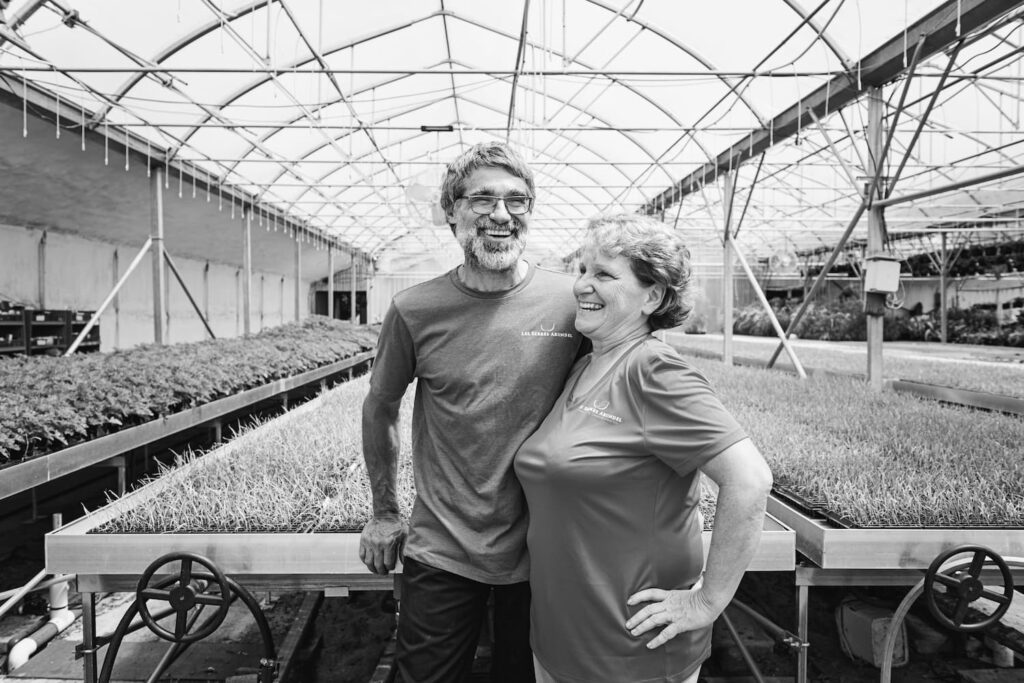
We learn a lot: it’s super useful to see how others operate! It gives us tips, new methods, and we are well supported. The challenge for a company like ours is finding the time. But it’s important, and we feel that our staff wants to get involved, to be better informed.
Johanne Meilleur, Owner
Long before the term ‘sustainable development’ became popular, Les Serres Arundel were already implementing several initiatives in this direction. Can you give us some examples?
Guy: Before there were as many recycling options as today, we were already doing our best to ensure our materials were recovered. All the plastic was saved for a company that would reclaim it: it wasn’t always easy, especially when they moved to the United States and we had to accumulate pots for 3-4 years before finding a new recycler! At the same time, we also tried to keep the plastic from the greenhouses a bit longer. When it’s time to change it, we split it into smaller pieces so that our customers who want to make small shelters for the garden or a homemade greenhouse can benefit from it. This allows the plastic to be reused instead of being sent for recycling.
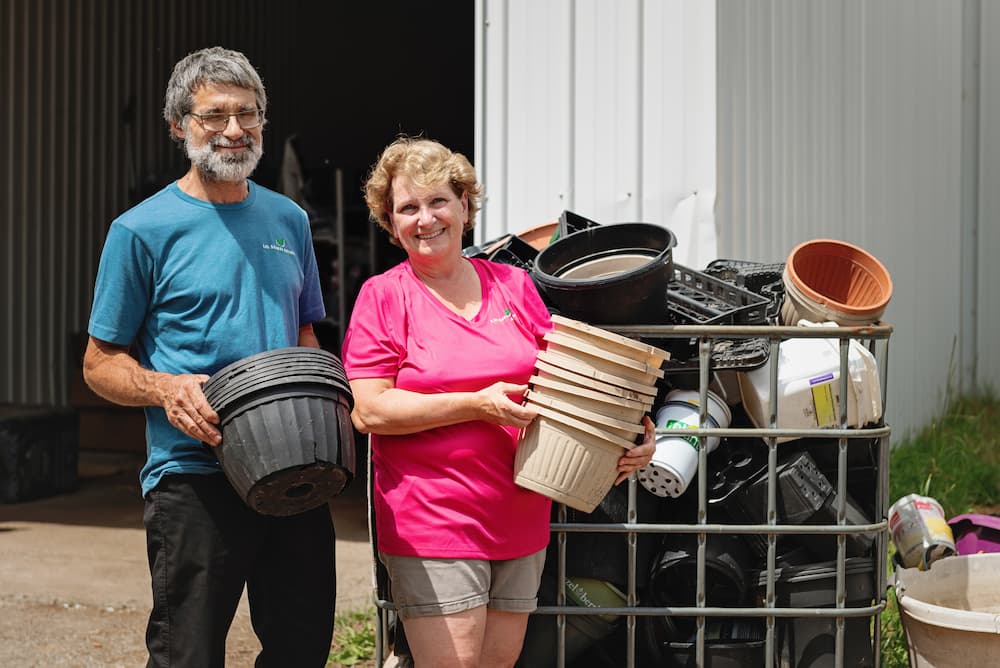
As for the pots, they are now collected once a year. We only send the ones that are broken and unusable, as we continue to reuse them as long as possible. We also encourage our customers to return their containers: they are then sorted based on their condition. This year, we are implementing a better bin system, so that customers can more easily sort their used containers at our two garden centers.
Johanne Meilleur, Owner
Guy: Back then, we had to find a company to wash the plastic and another one to recycle it. Now, it’s the same company that does both, and it’s much more convenient!
What changes have you made in terms of heating?
Guy: After heating with wood and oil, we changed our system to heat solely with wood and biomass. The workload for wood was significant: the volume to be heated had greatly increased, and we were up to 3 cords per day. With biomass, it became automatic: mill residues, bark… Now, a part is purchased from sorting centers. It’s definitely advantageous not to use oil – and the smell is much better. When the price of oil increased significantly, our costs remained stable because we had already eliminated it.
Regarding water conservation, what techniques have you implemented to replace sprinkler irrigation?
Guy: We completely eliminated the sprinkler system because it used a lot of water and led to waste. Since then, we water some parts by hand, and we have flood tables to water the rest from below and recover the water after irrigation. We also installed a carousel to weigh the baskets and determine the amount of water needed based on weight. When it’s well-calibrated, we use exactly the necessary amount of water, which also avoids waste.
Johanne: We really see the difference. We had fewer greenhouses and there were water shortages. Now we have a larger area and we don’t run out.
Johanne: We really see the difference. We had fewer greenhouses and there were water shortages. Now we have a larger area and we don’t run out.
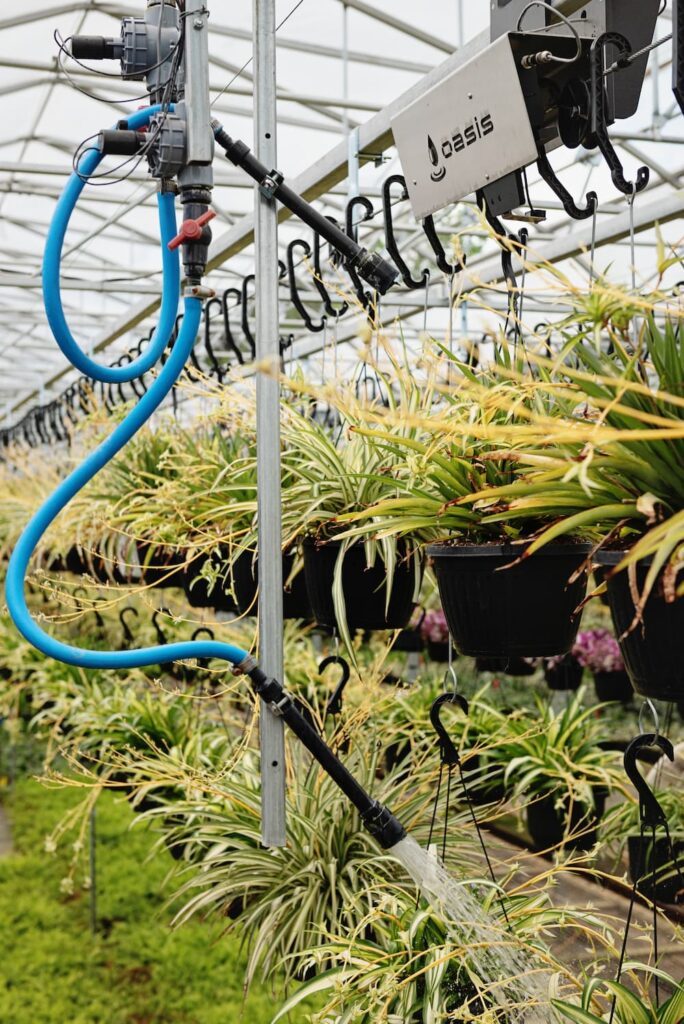
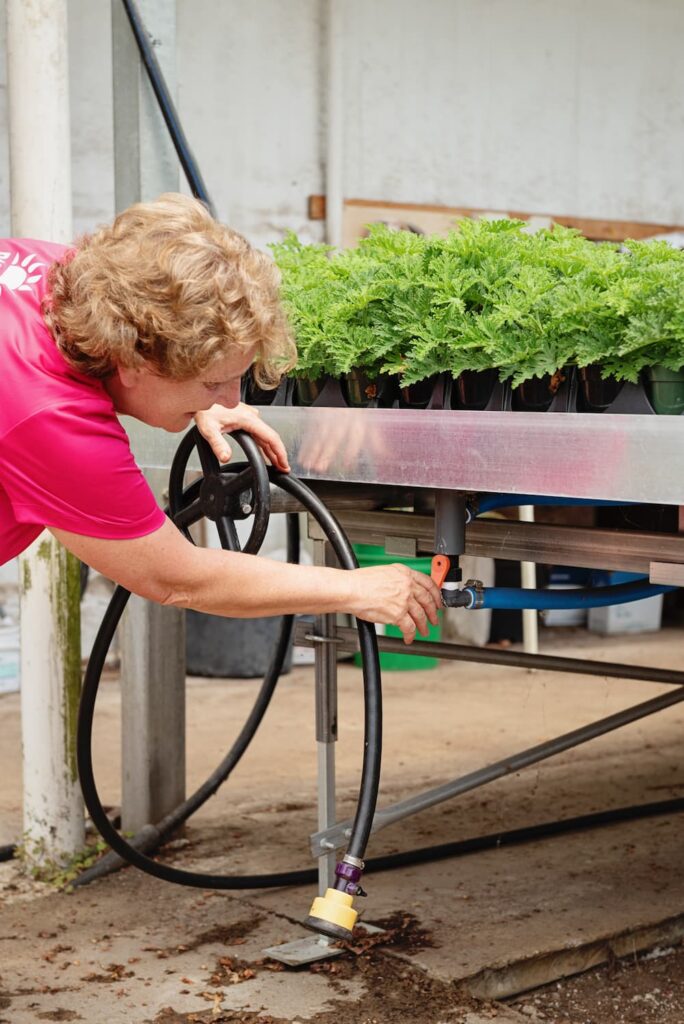
Guy: Now, as much as possible, we only use organic products and predatory insects. Spraying is really reserved for major cases, like when there’s a period of intense heat and we need to act quickly to avoid losing everything, which is quite rare. With vegetables (tomatoes, cucumbers, peppers), we manage without pesticides, and the predators work well. With flowers, it’s sometimes more challenging.
Johanne: The cultivation method is different: we need to be very proactive and anticipate which insects to use before an infestation occurs. It changes our way of doing things. We must integrate them right from the start. If the pest insect has already taken over, that’s when we have no choice but to use products. Fortunately, this remains rare and is never widespread spraying.
What are the other ongoing initiatives at Serres Arundel to limit waste?
Johanne: We’ve been doing bulk sales… since the 70s! People come with their vehicle to buy exactly the amount of potting soil they need, which greatly reduces the use of plastic bags. For the past 2 years, we also use biodegradable cardboard fiber pots for vegetables and herbs.
Can you easily count on customer participation for this kind of approach?
Johanne: Generally, yes. Bulk soil and pot recycling really work well. When people know that the option is available, they do it. For several years, our customers come in the spring with all their pots. I don’t think there’s a problem with participation; the main work is in communication.
What communication initiatives do you use to inform consumers about eco-friendly practices?
Johanne: We now use social media. For example, we released a video explaining our biomass heating system, provide information on reusing pots… We also organize activities, like during squash season. It’s very popular with families! Our Facebook page is mainly used for that. There are also nearby schools that visit our greenhouses, and we teach them many things.
Would you like to highlight other projects you are currently developing?
Johanne: We try to promote biodiversity: it’s something we care about. We are surrounded by fields. There’s even a honey producer who has set up beehives! Some fields are in corn production, others for Christmas trees, but we leave others free for natural flowers to grow and attract pollinators. We will continue in this direction.
What are your next challenges to tackle?
Guy: We participated in a MAPAQ program, and the goal is to reduce the electricity cost of the greenhouses. These are grants for several things, like thermal curtains, machinery… This year, we’re renovating a section of our greenhouses that’s several years old and aiming for better energy efficiency.
Johanne: In an ideal world, we’d also like to have a completely electric vehicle fleet, but we’re not there yet. We can say that it’s our longer-term goal!
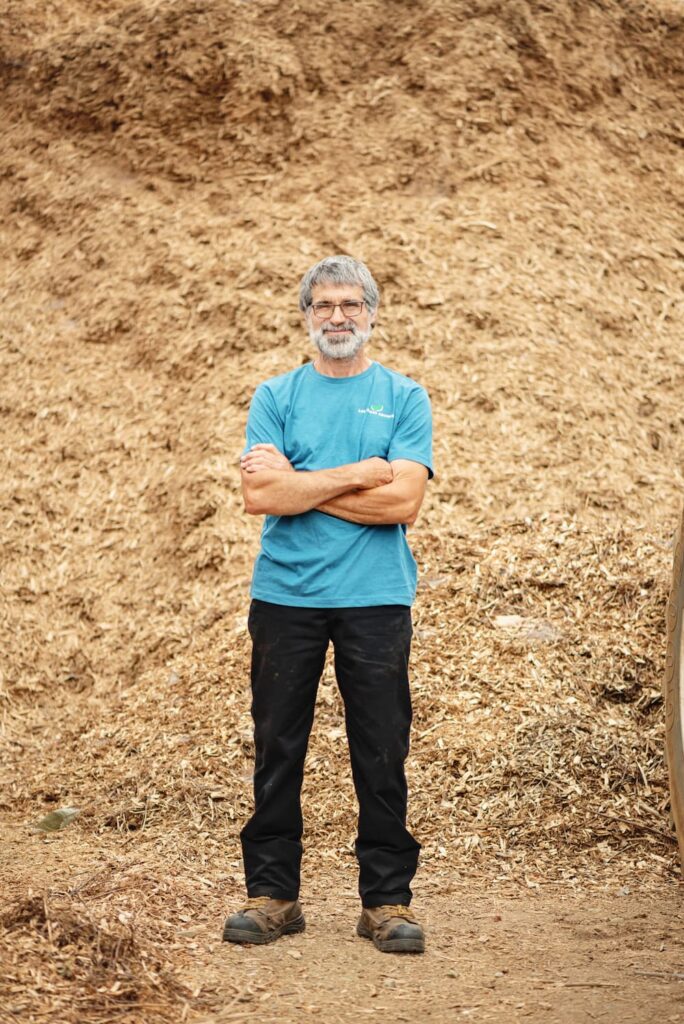
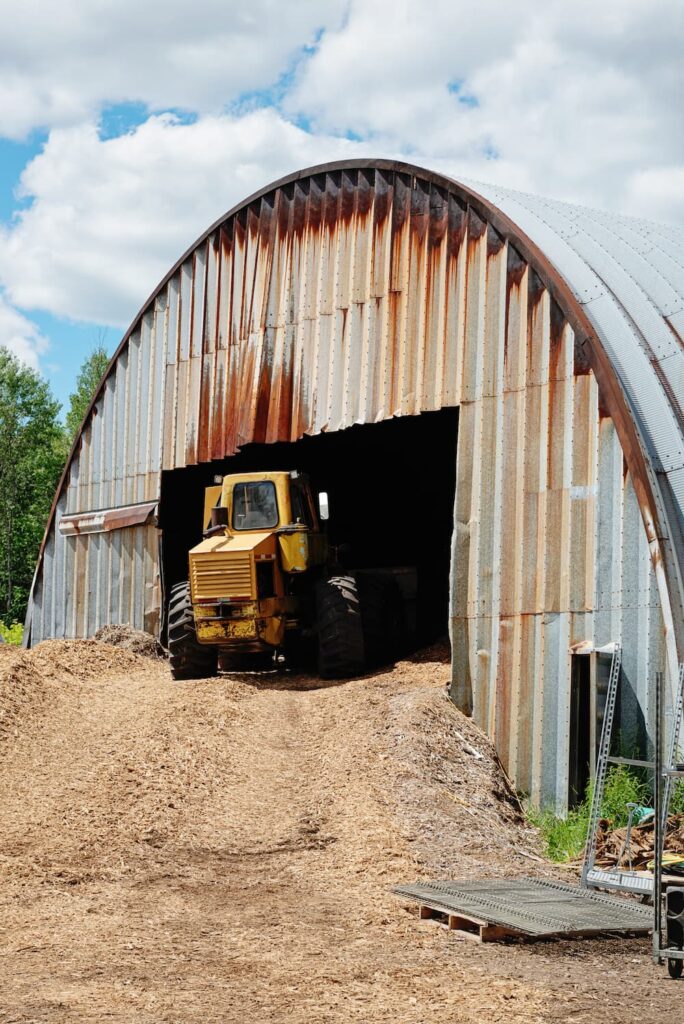
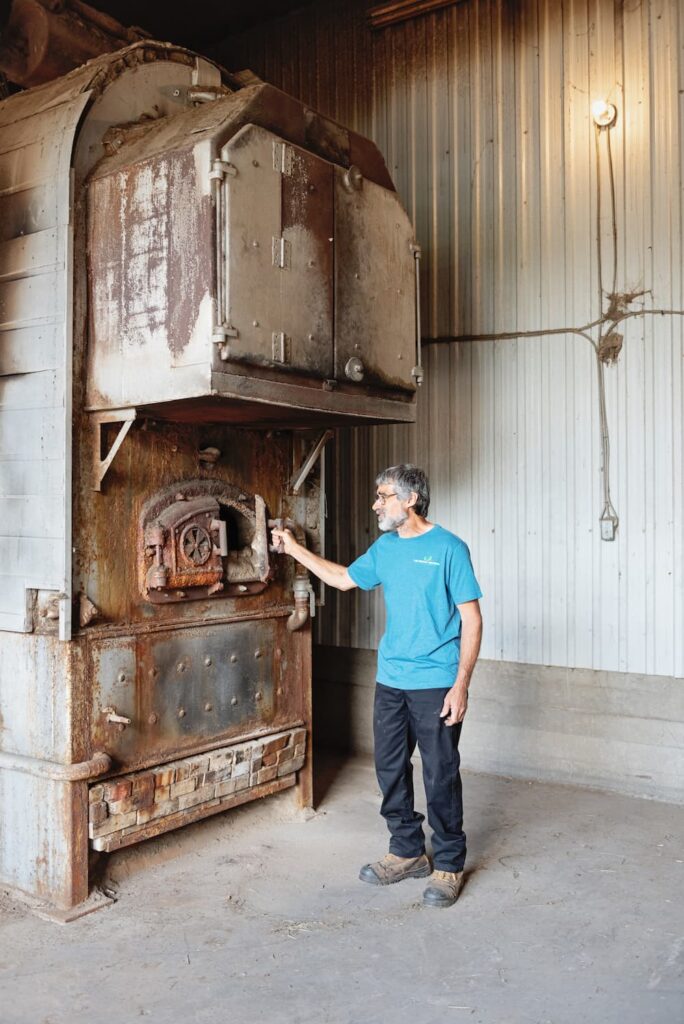
Arundel Greenhouses invites you to come and celebrate their 50th anniversary on September 10th, from 10 AM to 4 PM. On the agenda: guided tour, tractor ride, tasting, and more. For information: https://www.lesserresarundel.com/
